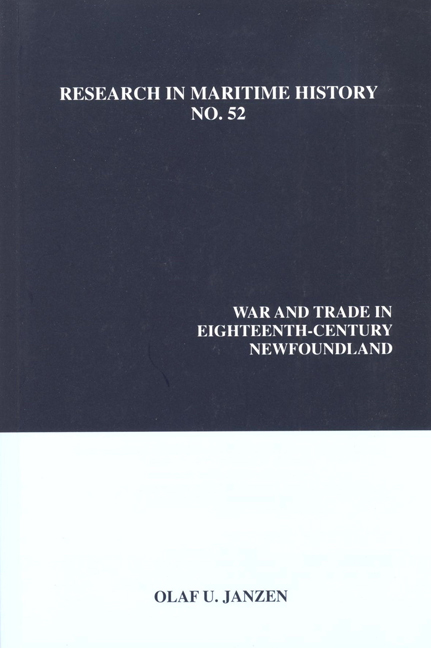Book contents
- Frontmatter
- Table of Contents
- About the Author
- Introduction
- “‘A World Embracing Sea:’ The Oceans as Highway, 1604-1815”
- “Of Consequence to the Service:' The Rationale behind Cartographic Surveys in Early Eighteenth-Century Newfoundland”
- “The Problem of Piracy in the Newfoundland Fishery in the Aftermath of the War of the Spanish Succession”
- “A Scottish Sack Ship in the Newfoundland Trade, 1726-1727”
- “'Une petite Republique' in Southwestern Newfoundland: The Limits of Imperial Authority in a Remote Maritime Environment”
- “The Illicit Trade in English Cod into Spain, 1739-1748”
- “Un Petit Dérangement: The Eviction of French Fishermen from Newfoundland in 1755”
- “The French Raid upon the Newfoundland Fishery in 1762: A Study in the Nature and Limits of Eighteenth-Century Sea Power”
- “Showing the Flag: Hugh Palliser in Western Newfoundland, 1763-1766”
- “The Royal Navy and the Interdiction of Aboriginal Migration to Newfoundland, 1763-1766”
- “The Royal Navy and the Defence of Newfoundland during the American Revolution”
- “The American Threat to the Newfoundland Fisheries, 1776-1777”
- Appendix
“The Illicit Trade in English Cod into Spain, 1739-1748”
- Frontmatter
- Table of Contents
- About the Author
- Introduction
- “‘A World Embracing Sea:’ The Oceans as Highway, 1604-1815”
- “Of Consequence to the Service:' The Rationale behind Cartographic Surveys in Early Eighteenth-Century Newfoundland”
- “The Problem of Piracy in the Newfoundland Fishery in the Aftermath of the War of the Spanish Succession”
- “A Scottish Sack Ship in the Newfoundland Trade, 1726-1727”
- “'Une petite Republique' in Southwestern Newfoundland: The Limits of Imperial Authority in a Remote Maritime Environment”
- “The Illicit Trade in English Cod into Spain, 1739-1748”
- “Un Petit Dérangement: The Eviction of French Fishermen from Newfoundland in 1755”
- “The French Raid upon the Newfoundland Fishery in 1762: A Study in the Nature and Limits of Eighteenth-Century Sea Power”
- “Showing the Flag: Hugh Palliser in Western Newfoundland, 1763-1766”
- “The Royal Navy and the Interdiction of Aboriginal Migration to Newfoundland, 1763-1766”
- “The Royal Navy and the Defence of Newfoundland during the American Revolution”
- “The American Threat to the Newfoundland Fisheries, 1776-1777”
- Appendix
Summary
In April 1740, the merchants of Bayonne complained to the Chamber of Commerce that a French vessel had arrived with a quantity of dry English cod. It had attempted without success to deliver this fish at the Spanish ports of Bilbao and San Sebastián before making for Saint-Jean-de-Luz, where it discharged part of its cargo. Now it had arrived at Bayonne, where it would remain briefly before renewing its efforts to carry the fish to Spain. Because Spain and England were at war, the normally substantial trade in English cod between those countries had been interrupted. French merchants, whose own cod trade with Spain had diminished considerably since the end of the previous century, had welcomed the war as an opportunity to regain their position. To discover that English cod continued to penetrate the Spanish market was quite alarming; to learn that French dealers were responsible was a scandal. The Bayonnais merchants therefore demanded that appropriate steps be taken to put a stop to the commerce. But while the authorities were sympathetic to the complaint, effective countermeasures were difficult to implement. One year later the contrôleur- général des finances learned that French participation in the traffic had persisted; he had received a report of a Malouin vessel being lost off Cape Finisterre while making for Cádiz with 5000 quintals of English cod. Although it was apparent by then that neutral traders, including Swedes and Danes but especially the Dutch, were also involved, the bulk of the carriers were French – twelve Malouin vessels were involved in 1741, according to one report, while another claimed that French vessels carried as much as 80,000 quintals of English cod annually to Bilbao alone. It was further alleged that some of those vessels carried not only cod but also English cloth. Such reports caused the authorities to redouble their efforts to stop the trade, but success remained elusive.
Several factors account for this failure, not least that Spain seemed to prefer English cod over that produced by France. According to one memorial, this was because English fishermen used Spanish salt, which was judged superior to French salt. Yet of at least equal importance was the determination by some French merchants to make the illicit trade in English cod the latest of several adaptive strategies not just to cope but to thrive in the increasingly difficult French fishery and trade in North America.
- Type
- Chapter
- Information
- War and Trade in Eighteenth-Century Newfoundland , pp. 99 - 118Publisher: Liverpool University PressPrint publication year: 2013



